初二下英语考点归纳
- 格式:doc
- 大小:42.50 KB
- 文档页数:5
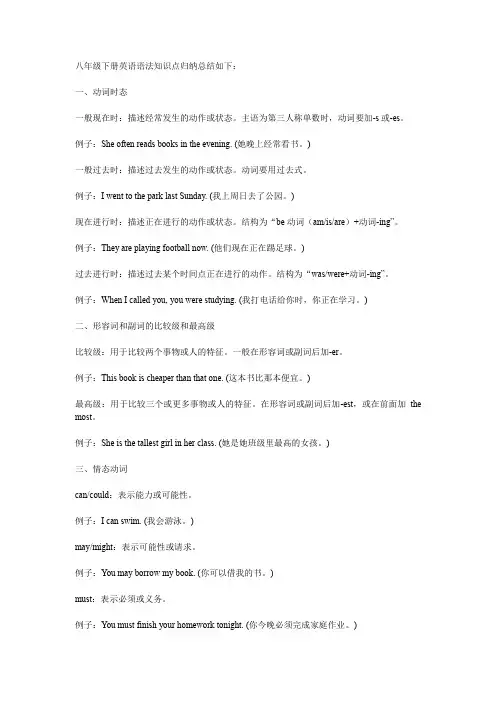
八年级下册英语语法知识点归纳总结如下:一、动词时态一般现在时:描述经常发生的动作或状态。
主语为第三人称单数时,动词要加-s或-es。
例子:She often reads books in the evening. (她晚上经常看书。
)一般过去时:描述过去发生的动作或状态。
动词要用过去式。
例子:I went to the park last Sunday. (我上周日去了公园。
)现在进行时:描述正在进行的动作或状态。
结构为“be动词(am/is/are)+动词-ing”。
例子:They are playing football now. (他们现在正在踢足球。
)过去进行时:描述过去某个时间点正在进行的动作。
结构为“was/were+动词-ing”。
例子:When I called you, you were studying. (我打电话给你时,你正在学习。
)二、形容词和副词的比较级和最高级比较级:用于比较两个事物或人的特征。
一般在形容词或副词后加-er。
例子:This book is cheaper than that one. (这本书比那本便宜。
)最高级:用于比较三个或更多事物或人的特征。
在形容词或副词后加-est,或在前面加the most。
例子:She is the tallest girl in her class. (她是她班级里最高的女孩。
)三、情态动词can/could:表示能力或可能性。
例子:I can swim. (我会游泳。
)may/might:表示可能性或请求。
例子:You may borrow my book. (你可以借我的书。
)must:表示必须或义务。
例子:You must finish your homework tonight. (你今晚必须完成家庭作业。
)四、被动语态被动语态用于描述事物的状态或描述被动发生的动作。
结构为“be动词(am/is/are/was/were)+动词的过去分词”。
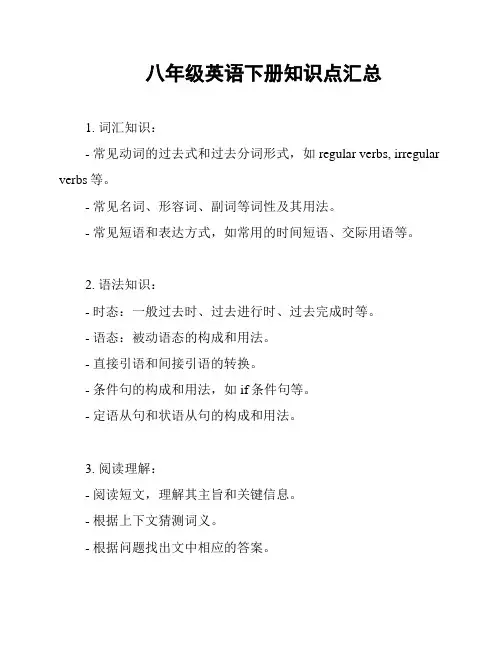
八年级英语下册知识点汇总
1. 词汇知识:
- 常见动词的过去式和过去分词形式,如regular verbs, irregular verbs等。
- 常见名词、形容词、副词等词性及其用法。
- 常见短语和表达方式,如常用的时间短语、交际用语等。
2. 语法知识:
- 时态:一般过去时、过去进行时、过去完成时等。
- 语态:被动语态的构成和用法。
- 直接引语和间接引语的转换。
- 条件句的构成和用法,如if条件句等。
- 定语从句和状语从句的构成和用法。
3. 阅读理解:
- 阅读短文,理解其主旨和关键信息。
- 根据上下文猜测词义。
- 根据问题找出文中相应的答案。
4. 写作技巧:
- 书面表达:写信、写作文等。
- 口头表达:进行简短的演讲、对话等。
- 语法和拼写的正确应用。
5. 听力技巧:
- 听取关键信息,如对话中的时间、地点、人物等。
- 根据对话内容回答问题。
- 培养对不同语速和语调的听力理解能力。
以上是八年级英语下册的主要知识点汇总,希望对你的学习有所帮助!。
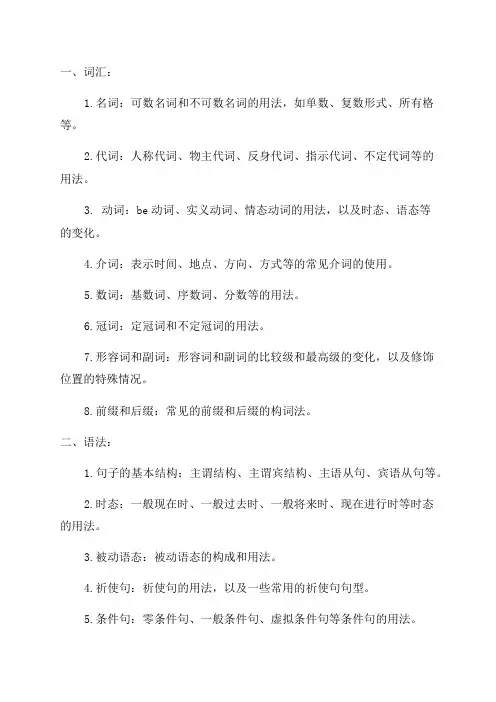
一、词汇:1.名词:可数名词和不可数名词的用法,如单数、复数形式、所有格等。
2.代词:人称代词、物主代词、反身代词、指示代词、不定代词等的用法。
3. 动词:be动词、实义动词、情态动词的用法,以及时态、语态等的变化。
4.介词:表示时间、地点、方向、方式等的常见介词的使用。
5.数词:基数词、序数词、分数等的用法。
6.冠词:定冠词和不定冠词的用法。
7.形容词和副词:形容词和副词的比较级和最高级的变化,以及修饰位置的特殊情况。
8.前缀和后缀:常见的前缀和后缀的构词法。
二、语法:1.句子的基本结构:主谓结构、主谓宾结构、主语从句、宾语从句等。
2.时态:一般现在时、一般过去时、一般将来时、现在进行时等时态的用法。
3.被动语态:被动语态的构成和用法。
4.祈使句:祈使句的用法,以及一些常用的祈使句句型。
5.条件句:零条件句、一般条件句、虚拟条件句等条件句的用法。
6.定语从句和状语从句:定语从句和状语从句的引导词和连接词的用法。
三、阅读理解:1.判断事实和推理:阅读短文,根据所读内容判断事实的真伪,以及进行简单的推理。
2.理解细节:从短文中找出相关细节,回答问题或完成任务。
3.推断意义:通过猜测词义、上下文推断等,理解隐含在短文中的意义。
4.主旨归纳:根据短文的内容,概括出短文的主旨或中心思想。
5.信息归纳:将短文中的信息按照一定的组织方式进行归纳。
以上是八年级下英语知识点的大致归纳,涵盖了词汇、语法和阅读理解等方面。
当然,具体的知识点还需要结合具体教材和学校的教学要求来确定。
希望以上内容对您有所帮助。
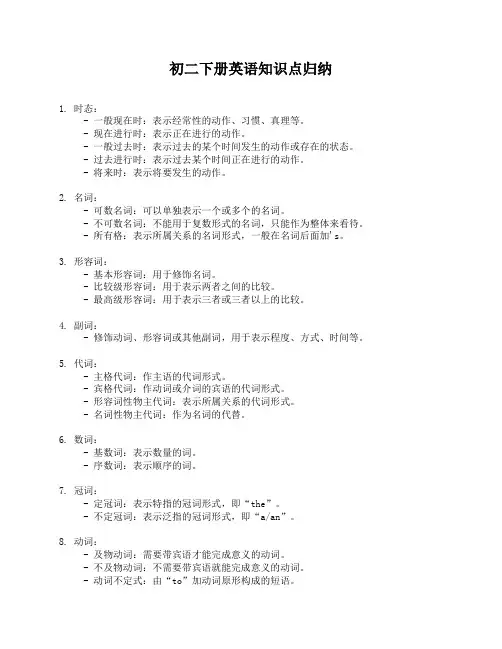
初二下册英语知识点归纳1. 时态:- 一般现在时:表示经常性的动作、习惯、真理等。
- 现在进行时:表示正在进行的动作。
- 一般过去时:表示过去的某个时间发生的动作或存在的状态。
- 过去进行时:表示过去某个时间正在进行的动作。
- 将来时:表示将要发生的动作。
2. 名词:- 可数名词:可以单独表示一个或多个的名词。
- 不可数名词:不能用于复数形式的名词,只能作为整体来看待。
- 所有格:表示所属关系的名词形式,一般在名词后面加's。
3. 形容词:- 基本形容词:用于修饰名词。
- 比较级形容词:用于表示两者之间的比较。
- 最高级形容词:用于表示三者或三者以上的比较。
4. 副词:- 修饰动词、形容词或其他副词,用于表示程度、方式、时间等。
5. 代词:- 主格代词:作主语的代词形式。
- 宾格代词:作动词或介词的宾语的代词形式。
- 形容词性物主代词:表示所属关系的代词形式。
- 名词性物主代词:作为名词的代替。
6. 数词:- 基数词:表示数量的词。
- 序数词:表示顺序的词。
7. 冠词:- 定冠词:表示特指的冠词形式,即“the”。
- 不定冠词:表示泛指的冠词形式,即“a/an”。
8. 动词:- 及物动词:需要带宾语才能完成意义的动词。
- 不及物动词:不需要带宾语就能完成意义的动词。
- 动词不定式:由“to”加动词原形构成的短语。
9. 介词:- 用于连接名词、代词或动词与其他词语的词。
10. 连词:- 表示并列关系的连词,如“and, but, or”等。
- 表示选择关系的连词,如“either…or, neither…nor”等。
- 表示因果关系的连词,如“because, so, therefore”等。
11. 疑问句:- 一般疑问句:以助动词、情态动词或be动词开头的陈述句,问句式为“助动词/情态动词/be动词+主语+谓语?”- 特殊疑问句:用特殊疑问词引导的疑问句,如“what, when, where, who, which, why, how”等。
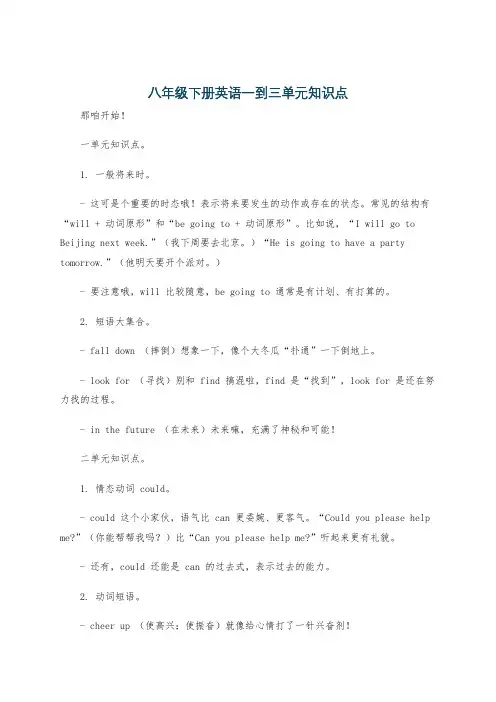
八年级下册英语一到三单元知识点那咱开始!一单元知识点。
1. 一般将来时。
- 这可是个重要的时态哦!表示将来要发生的动作或存在的状态。
常见的结构有“will + 动词原形”和“be going to + 动词原形”。
比如说,“I will go to Beijing next week.”(我下周要去北京。
)“He is going to have a party tomorrow.”(他明天要开个派对。
)- 要注意哦,will 比较随意,be going to 通常是有计划、有打算的。
2. 短语大集合。
- fall down (摔倒)想象一下,像个大冬瓜“扑通”一下倒地上。
- look for (寻找)别和 find 搞混啦,find 是“找到”,look for 是还在努力找的过程。
- in the future (在未来)未来嘛,充满了神秘和可能!二单元知识点。
1. 情态动词 could。
- could 这个小家伙,语气比 can 更委婉、更客气。
“Could you please help me?”(你能帮帮我吗?)比“Can you please help me?”听起来更有礼貌。
- 还有,could 还能是 can 的过去式,表示过去的能力。
2. 动词短语。
- cheer up (使高兴;使振奋)就像给心情打了一针兴奋剂!- give out (分发;散发)把东西一个一个发出去。
- come up with (想出;提出)脑袋里突然蹦出个好主意。
3. 感叹句。
- What + (a/an) + 形容词 + 名词 + (主语 + 谓语)!“What a beautiful flower!”(多美的花啊!)- How + 形容词/副词 + (主语 + 谓语)!像“How fast he runs!”(他跑得多快啊!)1. 过去进行时。
- 这是在讲过去某个时刻正在进行的动作。
结构是“was/were + 动词的现在分词”。
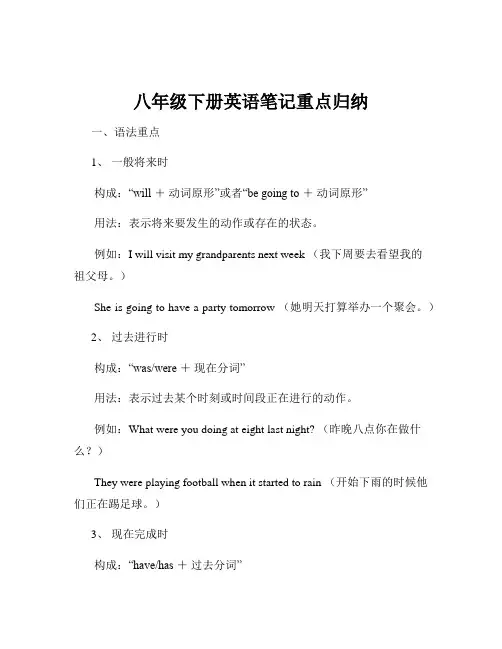
八年级下册英语笔记重点归纳一、语法重点1、一般将来时构成:“will +动词原形”或者“be going to +动词原形”用法:表示将来要发生的动作或存在的状态。
例如:I will visit my grandparents next week (我下周要去看望我的祖父母。
)She is going to have a party tomorrow (她明天打算举办一个聚会。
)2、过去进行时构成:“was/were +现在分词”用法:表示过去某个时刻或时间段正在进行的动作。
例如:What were you doing at eight last night? (昨晚八点你在做什么?)They were playing football when it started to rain (开始下雨的时候他们正在踢足球。
)3、现在完成时构成:“have/has +过去分词”用法:表示过去发生的动作对现在造成的影响或结果,或者从过去开始一直持续到现在的动作或状态。
例如:I have already finished my homework (我已经完成了我的作业。
)She has lived here for ten years (她在这里住了十年了。
)4、宾语从句引导词:that(在口语或非正式文体中常省略)、if/whether(是否)、特殊疑问词(what, when, where, why, how 等)语序:宾语从句要用陈述句语序。
时态:主句是一般现在时,从句根据实际情况使用各种时态;主句是一般过去时,从句要用相应的过去时态。
例如:He says that he is a student (他说他是一名学生。
)I don't know if he will come tomorrow (我不知道他明天是否会来。
)5、情态动词should :表示“应该”,用于提出建议或表达义务。
could :表示“能,可以”,语气比 can 更委婉。
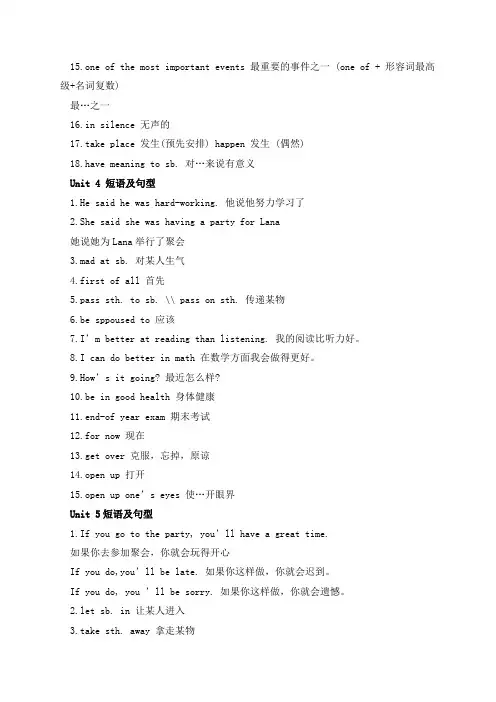
八年级下册英语知识点最全归纳Unit 1 短语及句型1.many\\much---- more + 可数或不可数名词更多few --- fewer + 可数名词更多little ----- less +不可数名词更少例如:more people、more pollution、less free time、less pollution、fewer cars、fewer trees2.there will be 将会有 There will be more people.将会有更多的人Will there be less pollution?会有更少的污染吗?Yes,there will.\\ No,there won’t.是,会有。
\\ 不,不会有。
3.be free 免费的4. on computers 在电脑上 on paper 在纸上5.live to be 活到 live to be 200 years old 活到200岁6.fall in love with sb.\\sth. 喜爱某人或某物7.live alone 单独居住8.on vacation 度假9.over and over again 一遍又一遍10.be the same as 与…一样be different from 与…不同unit 2 单词及短语1.What should I \\he\\she\\they\\you do? 我\\他\\她\\他们\\你该怎么办? You could write him a letter. 你可以给他写一封信。
2.argued with sb. 与某人争吵3.out of style 过时的 in style 时尚的4.a ticket to a ball game 一场球赛的票5.surprise sb. 使某人惊奇be surprised at sth. 对…感到惊奇to one’s surprise 令某人惊奇的事6.pay for 支付7.ask sb. for sth. 向某人要求某物ask sb. to do sth. 要求某人做某事8.have a bake sale 烧烤9.find out 发现,查明10.get on well with sb. 与某人相处得好11.have a fight with sb. 与某人争吵、打架12.not……until 直到…才13.it’s time for sth.\\it’s time to do sth. 做某事的时间到了14.under too much pressure 承受太多的压力15.take part in 参加,参与16.a mother of three 三个孩子的妈妈Unit 3 短语及句型1.What were you doing when the UFO arrived?当UFO到达时你在干什么?2.While the boy was walking down the street, the UFO landed. 当男孩在沿着街道走时,UFO降落了3.in front of 在…之前(外部整体前)in the front of (内部整体前)4.talk on the phone 在电话中交谈nd on the street 在街上降落6.walk down the street 沿着街道走7.take off (过去式 took off) 起飞8.around ten o’clock 大约10点9.You can imagine how strange it was!你可以想象它有多奇怪!10.Museum of Flight 飞行博物馆11.jump down 跳下来12.in a tree 在树上 on a tree 长在树上13.run away 跑开,逃跑14.say to sb. 对某人说15.one of the most important events 最重要的事件之一 (one of + 形容词最高级+名词复数)最…之一16.in silence 无声的17.take place 发生(预先安排) happen 发生 (偶然)18.have meaning to sb. 对…来说有意义Unit 4 短语及句型1.He said he was hard-working. 他说他努力学习了2.She said she was having a party for Lana她说她为Lana举行了聚会3.mad at sb. 对某人生气4.first of all 首先5.pass sth. to sb. \\ pass on sth. 传递某物6.be sppoused to 应该7.I’m better at reading than listening. 我的阅读比听力好。
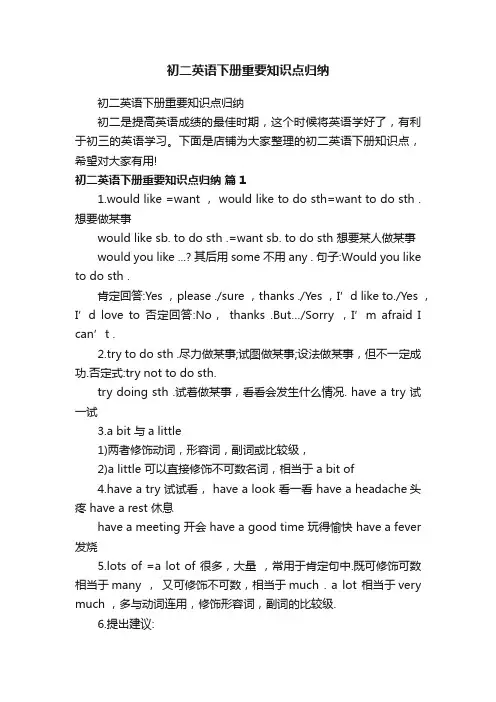
初二英语下册重要知识点归纳初二英语下册重要知识点归纳初二是提高英语成绩的最佳时期,这个时候将英语学好了,有利于初三的英语学习。
下面是店铺为大家整理的初二英语下册知识点,希望对大家有用!初二英语下册重要知识点归纳篇11.would like =want , would like to do sth=want to do sth . 想要做某事would like sb. to do sth .=want sb. to do sth 想要某人做某事would you like ...? 其后用some 不用any . 句子:Would you like to do sth .肯定回答:Yes ,please ./sure ,thanks ./Yes ,I’d like to./Yes ,I’d love to 否定回答:No,thanks .But…/Sorry ,I’m afraid I can’t .2.try to do sth .尽力做某事;试图做某事;设法做某事,但不一定成功.否定式:try not to do sth.try doing sth .试着做某事,看看会发生什么情况. have a try 试一试3.a bit 与a little1)两者修饰动词,形容词,副词或比较级,2)a little 可以直接修饰不可数名词,相当于a bit of4.have a try 试试看, have a look 看一看 have a headache头疼 have a rest 休息have a meeting 开会 have a good time 玩得愉快 have a fever 发烧5.lots of =a lot of 很多,大量,常用于肯定句中.既可修饰可数相当于many ,又可修饰不可数,相当于much . a lot 相当于very much ,多与动词连用,修饰形容词,副词的比较级.6.提出建议:1)Let’s do sth.让我们做…吧.2)How about /what about doing sth ?做..怎么样3)Why not do sth ?为什么不…?4)Would you like to do …?你愿意做….吗?5)Shall we do …?我们做…好吗?6)You’d better(not) do ..你最好(不)做某事.7.Thanks for sth. =Thank you for sth. 因…而感谢.后V+ing . Thanks to 幸亏,由于,归功于.8.leave a message留个口信, take/have a message for sb.给某人带个口信.9.hear from sb.=get /receive a letter from sb . 收到…的来信hear about /of 得悉,听说Hear out 听完 hear to 同意10.can’t wait to do sth .迫不及待做某事 wait for 等候…,后接等待的对象,名词或代词wait to do sth .等着做某事初二英语下册重要知识点归纳篇2交际用语1. We’re all by ourselves.2. I fell a little afraid.3. Don’t be afraid.4. Help!5. Can’t yo u hear anything?6. I can’t hear anything / anybody there.7. Maybe it’s a tiger.8. Let’s get it back before they eat the food.9. Did she learn all by herself?10. Could she swim when she was …years old?11. She didn’t hurt herself.12. He couldn’t buy himself many nice things.13. Did he enjoy himself?14. Help yourselves.15. Bad luck!16. Come on!17. Well done! Congratulations (to…)!初二英语下册重要知识点归纳篇31. How often do you exercise? 你(你们)多久锻炼一次身体?How often + 助动词do(does或did) + 主语 + do sth.? 疑问词how often是问频率(多久一次),(在这里助动词do(does或did) 是起帮助构成疑问的`作用)与一般现在时或一般过去时连用,回答一般是用表示频率的副词,如:once,twice,three times,sometimes,often,quite,often,never,every day,once a week ,twice a month , three times a month , three or four times a month 等。
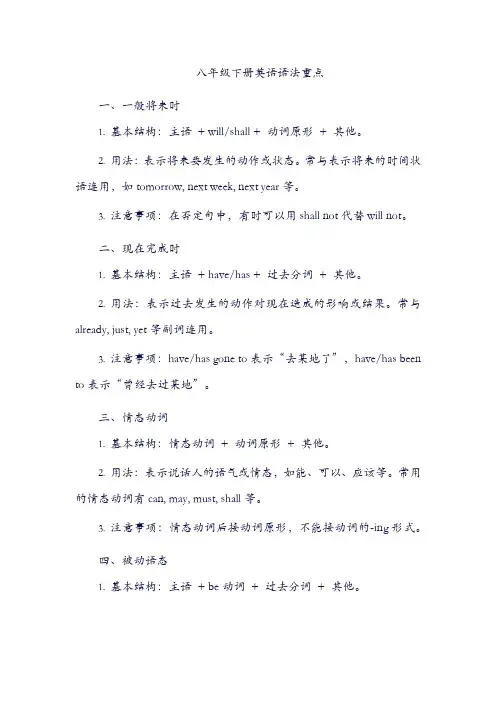
八年级下册英语语法重点一、一般将来时1.基本结构:主语+ will/shall + 动词原形+ 其他。
2.用法:表示将来要发生的动作或状态。
常与表示将来的时间状语连用,如tomorrow, next week, next year等。
3.注意事项:在否定句中,有时可以用shall not代替will not。
二、现在完成时1.基本结构:主语+ have/has + 过去分词+ 其他。
2.用法:表示过去发生的动作对现在造成的影响或结果。
常与already, just, yet等副词连用。
3.注意事项:have/has gone to表示“去某地了”,have/has been to表示“曾经去过某地”。
三、情态动词1.基本结构:情态动词+ 动词原形+ 其他。
2.用法:表示说话人的语气或情态,如能、可以、应该等。
常用的情态动词有can, may, must, shall等。
3.注意事项:情态动词后接动词原形,不能接动词的-ing形式。
四、被动语态1.基本结构:主语+ be动词+ 过去分词+ 其他。
2.用法:表示主语是动作的接受者。
常与by引导的方式状语连用,如by machine, by air等。
3.注意事项:被动语态的时态变化主要通过be动词的变化来实现,不同时态的被动语态需要注意与该时态的主动语态相对应。
五、不定代词和冠词用法1.不定代词:表示泛指或不确定的代词,如some, any, other等。
some用于肯定句,any用于否定句或疑问句;other表示“其他的”。
2.冠词:表示特指或泛指的词,分为定冠词the和不定冠词a/an。
a用于辅音音素开头的单词前,an用于元音音素开头的单词前;the 表示特指或上文提到的某个名词。
3.用法:不定代词和冠词一起使用时,可以构成限定词短语,如some books, the school gate等。
限定词短语可以修饰名词,表示特指或泛指的概念。
4.注意事项:在英语中,不定代词和冠词的使用是有规则和限制的,需要根据上下文和语境来判断使用哪个代词或冠词。
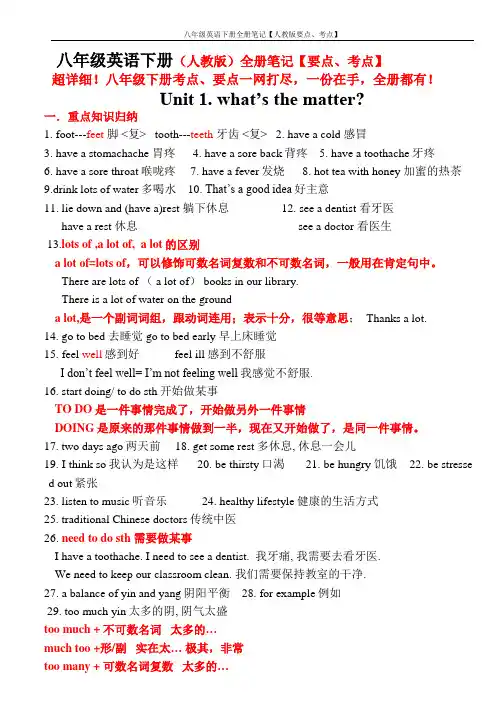
八年级英语下册(人教版)全册笔记【要点、考点】超详细!八年级下册考点、要点一网打尽,一份在手,全册都有!Unit 1. what’s the matter?一.重点知识归纳1. foot---feet脚 <复> tooth---teeth 牙齿 <复>2. have a cold 感冒3. have a stomachache 胃疼4. have a sore back背疼5. have a toothache牙疼6. have a sore throat喉咙疼7. have a fever发烧8. hot tea with honey 加蜜的热茶9.drink lots of water多喝水 10. That’s a good idea好主意11. lie down and (have a)rest 躺下休息 12. see a dentist 看牙医have a rest 休息 see a doctor 看医生13.lots of ,a lot of, a lot的区别a lot of=lots of,可以修饰可数名词复数和不可数名词,一般用在肯定句中。
There are lots of ( a lot of) books in our library.There is a lot of water on the grounda lot,是一个副词词组,跟动词连用;表示十分,很等意思; Thanks a lot.14. go to bed 去睡觉 go to bed early 早上床睡觉15. feel well感到好 feel ill 感到不舒服I don’t feel well= I’m not feeling well我感觉不舒服.16. start doing/ to do sth开始做某事TO DO 是一件事情完成了,开始做另外一件事情DOING是原来的那件事情做到一半,现在又开始做了,是同一件事情。
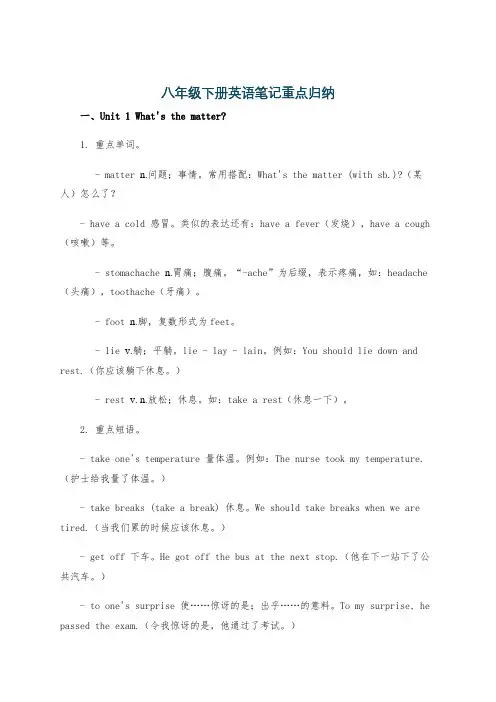
八年级下册英语笔记重点归纳一、Unit 1 What's the matter?1. 重点单词。
- matter n.问题;事情。
常用搭配:What's the matter (with sb.)?(某人)怎么了?- have a cold 感冒。
类似的表达还有:have a fever(发烧),have a cough (咳嗽)等。
- stomachache n.胃痛;腹痛。
“-ache”为后缀,表示疼痛,如:headache (头痛),toothache(牙痛)。
- foot n.脚,复数形式为feet。
- lie v.躺;平躺。
lie - lay - lain。
例如:You should lie down and rest.(你应该躺下休息。
)- rest v. n.放松;休息。
如:take a rest(休息一下)。
2. 重点短语。
- take one's temperature 量体温。
例如:The nurse took my temperature.(护士给我量了体温。
)- take breaks (take a break) 休息。
We should take breaks when we are tired.(当我们累的时候应该休息。
)- get off 下车。
He got off the bus at the next stop.(他在下一站下了公共汽车。
)- to one's surprise 使……惊讶的是;出乎……的意料。
To my surprise, he passed the exam.(令我惊讶的是,他通过了考试。
)- What should I do? 我应该做什么?用于询问建议。
- You should see a dentist and get an X - ray. 你应该去看牙医并且拍个X 光片。
should为情态动词,后接动词原形,表示建议。
英语八年级下半年知识点英语八年级下半年是一个非常关键的时期,这个时期学生的英语水平将会面临很多挑战。
在这个时期,学生应该掌握一些关键的知识点。
下面是英语八年级下半年的知识点。
一、语法1. 过去进行时过去进行时表示过去某个时间正在进行的动作,结构为was/were+现在分词。
2. 现在完成时现在完成时表示过去发生的动作对现在的影响,结构为have/has+过去分词。
3. 间接引语当我们转述别人的话时,要使用间接引语。
其中,动词需要根据时态的变化而变化。
4. 条件状语从句条件状语从句表示如果某个条件成立,就会发生某个结果。
其中,结构为if+主语+谓语,主句用一般将来时或者一般现在时。
5. 同位语从句同位语从句用于解释、说明或者补充名词的内容。
其中,关系代词的选择要根据意义来确定。
二、阅读理解1. 阅读速度在阅读理解中,阅读速度是非常关键的一个因素。
学生需要在平时的英语学习中提高自己的阅读速度,以便更准确地理解文章的内容。
2. 阅读技巧在阅读理解中,有很多技巧是可以帮助学生更好理解文章的内容的。
比如,可以利用关键词快速定位文章中心,也可以通过猜测单词的意义来理解文章的内容。
3. 阅读策略在阅读理解中,学生需要制定一些阅读策略,以便更好地理解文章的内容。
比如,可以先快速浏览文章,然后再仔细阅读。
三、写作技巧1. 缩写在写作中,缩写可以帮助学生更好地掌握文章的节奏和语感。
学生需要注意缩写的使用规则,以免使用不当。
2. 连词在写作中,连接词可以帮助文章更流畅地进行。
常见的连接词有and、but、or等。
3. 动词时态在写作中,动词时态的正确使用非常重要。
学生需要根据文章的时态来选择动词的形式,以便更好地表达自己的意思。
四、口语能力1. 具体交流口语能力的关键在于能够具体地表达自己的意思。
学生需要学会用具体的词汇和句子来表达自己的想法。
2. 流利表达口语能力的另一个关键在于流利表达。
学生需要利用平时的英语学习机会,不断提高自己的英语口语水平。
八年级英语下册全册各单元知识点考点整理Unit 1 what's the matter?一、重点短语1.too much太多2.lie down躺下3.get an X-ray做个X光检查4.take one’s temperature量体温5.put some medicine on......在....上敷药6.have a fever发烧7.take breaks/take a break休息8.without thinking twice没多想9.get off下车10.take sb to the hospital送某人去医院11.wait for等待12.to one’s surprise使.......惊讶的13.thanks to多亏于;由于14.in time及时15.think about考虑16.have a heart problem患有心脏病17.get into the trouble遇到麻烦18.do the right thing做正确的事情事情19.fall down摔倒20.put......on sth把...放在某物上21.get hit/sunburned摔伤/烧伤22.be interested in对.....感兴趣23.be used to习惯于....24.take risks/take a risk挑战25.lose one’s life失去生命26.because of因为27.run out of用完28.cut off切除29.get out of从...出来30.make a decision/decisions做决定31.be in control of掌管;管理32.give up放弃主要句型1.It’s+形容词+for sb.+to do sth.做某事对某人来说是…的。
It’s important to do sth.做某事很重要。
人教版八年级英语下册重要语法知识点汇总人教版八年级英语下册重要语法知识点汇总1. 否定句型1) 一般否定句I don't know this. No news is good news.There is no person (smoke)/not a person/not any person (smoke) in the house.2)特指否定He went to his office, not to see him.I am sorry for not coming on time.I don't think/believe/suppose/feel/imagine you are right.3)部分否定All the answers are not right//All is not gold that glittersI don't know all of them.//I can't see everybody/everything.Both of them are not right.4)全体否定None of my friends smoke.//I can see nothing/nobody.Neither of them is right.//Nothing can be so simple as this.5) 延续否定You didn't see him, neither/nor did I.You don't know, I don't know either.He doesn't know English, let alone/to say nothing of/not to speak of (更不用说) French.6) 半否定句We seldom/hardly/scarcely/barely hear such fine singing.I know little English. I saw few people.7) 双重否定You can't make something out of nothing.//What's done cannot be undone. There is no sweet without sweat.//No gain without pains.I can't help /keep/ laughing whenever I hear it.No man is so old but (that) he can learn.8)排除否定Everyone is ready except you.//He did nothing but play.But for your help, I couldn't do it.9)加强否定I won't do it at all.//I can't see it any more.//He is no longer a boy.2. 判断句型1) 一般判断句It is important for us to learn English.It is kind of you to help me sincere means honest.The boy is called/named Tom.We regarded/consider it as an honor.2)强调判断It is English that we should learn.//It is he who helped me a lot.3)弱式判断Your sentence doesn't sound/look/appear/feel right.You look/seem as if/as thought you had been there before.Maybe/Perhaps/ she is ill.He is probably ill.//He is likely ill. //It is possible that he is late 4) 注释判断He can remember so many English words, that is (to say) he is a living dictionary.(活字典)5) 正反判断That sounds all right, but in fact it is not.6) 比较判断It is more a picture than a poem.7) 互斥判断He or you are wrong. Either he is right or I am.3. 祝愿祁使句式1) 一般句式Study hard and keep fit. Be brave! Don't be shy! Get out of here.2)强语式Do tell me. Never tell a lie.3) 委婉祈使句Please tell me the true. Would/Will/Won't do me a favor?Would/Do you mind my smoking? What/How/ about going on foot?4)建议祈使句Let us go. Let us know the time. Don't let the fire out.Let's not waste the time. You'd better start early.Shall we listen to some music? Why don't you get something to drink? Suppose/supposing you pick me up at about six?I suggest we (should) take the train.5)祝愿句Success to you! //Wish you a good journey.May you have a happy marriage. //Here's to your success!Allow me to propose a toast to our friendship!4. 感叹句型How well he speaks! //How kind she is! //What a nice weather it is! Here he comes! //Such is life! //Wonderful! // Help!5. 疑问句型1) 一般疑问句Is he a doctor?//Do you the way to the station?2)反意疑问句He is a teacher, isn't he?//It is quite cheap, don't you think?3) 特殊疑问句What is the distance/width/size/population/temperature/fare?Who is he? What is he?(干什么的)//What is he like? // How is he? How do you like him? //What do you think of him?What ever do you mean by saying this?4)选择疑问句He is a doctor or a nurse?5)间接疑问句Do you know how old he is? //Tell me if (whether) you like it.What do you think/say/suppose I should do?6. 数词句型1) 表数目It is exactly ten o'clock.//It is five miles away from here.He is more than/over/ at least not less than 20.He is under/at most/no more than 20.2)表年月日He was born on April 22 1994/in 1994 on the morning of Oct.1.3)表年龄He is 20 years old/years of age.//He is at the age of 10.4)表倍数It is four times that of last years.This is four times as big (again) as that one.This is four times bigger than that one.The income is double what it was.The output of coal was 200% greater than in 1998.5)表计量It is 10 meters long/wide/high.//It costs me 100 yuan.I spent 10 hours to finish it.//It took me 10 days to finish it.It is worth 100 yuan.7. 关联指代句型1)两项关连I have two books, one is Chinese; the other English.I have five books, one is Chinese; the others English.To say is one thing, but/and/ to do is another.One the one hand, I am your teacher, and on the other hand, I am also you friend.Some like to play football, others are fond of basketball.2)先后顺序First/firstly, I wish good health, second/secondly success in your study, third/thirdly good luck in everything.First stop, then look, finally cross.At first/in the beginning/ he word hard. Later/Afterwards he is not so diligent.3)修饰限制This is the same book as I lost yesterday.This is the same book that I lost yesterday.(同一本书)Don't trust such a man as over praise you.He/One/Those/They who should come failed to appear.A man/A person/The one/Anyone/People who saw her liked her very much.The day/time/moment will come when China is strongest in the world.4) 两项连接He can speak not only English but also French.The book is both interesting and instructive.It is neither cold nor hot.Please either come in or go out.The old worker has experience and knowledge as well.5)加和关系Besides literature, we have grammar and writing.Apart from oxygen, there are some other gases in the air.In addition to "if", there is many other conjunctions that can introduce conditional clauses.I must go now, incidentally, if you want that book.You seem to like tea, so do I.8. 比较句型1)等比句He is as tall as I. // He is the same height as I.She is no less diligent than he. The lab is no better than a cottage.2) 差比句I speak English worse than he does.//He is not so/as tall as I am.Our knowledge is much inferior to their.3) 极比句He is the tallest of all in the class.None/No one/ is so blind as those that won't see.Nothing is so easy as this.4)比例句The more a man knows, the more he feels his ignorance(无知).5) 择比句He is taller than any other boy in the classIt is better late than never.//They would die than live as slavesHe prefers doing to talking//He prefers to do rather than to talk.He prefers mathematics to English.//I'd rather stay here.6)对比句You think me idle, but on the contrary, I am busy.They are working hard while you are wasting your time.9. 比喻句型We must work like him.//He behaves as his father does.He speaks English as if/though he was a foreigner.10. 条件假设句1) 一般事实If we succeed, what will the people say?Suppose it rains, what shall we do?Persevere(坚持) and you'll succeed.2)虚拟条件句If I were you, I would go.//If you had seen it, you would have been moved.3)反条件句Unless you try, you'll never succeed.//Don't move, or/else/otherwise I'll shot.4)唯一条件句If only I have another chance, I shall do better.Only in this way can we learn English well.So/As long as we don't lose heart, we'll succeed.5)推论条件句Since that is so, there is no more to say.Now that you are grown up, you must stop this behavior.11. 时间句型1)一般时When I see him, I'll tell him.2) 表同时You'll grow wiser as you grow older.Work while you work, play while you play.He worked, at the same/in the meantime he listened to the music.3)限制时Every/each time when I went to his house, he was out.By the time that we got there, he was out.4)交替时Sometimes he sings, sometimes he dances.At one time the baby cries, at another it talks.5)先时I stopped hem before he began to talk with me.6)后时I'll tell you after I finish it.7)紧接时As soon as I see him, I'll tell him.Once you begin, you must continue.The (very) moment/instant (that) I saw him, I recognized him. On hearing the news, she bust into tears.Hardly had I seen the light, when I heard a loud thundering.8)延续时I haven't seen him since I came here.A friend is never know till/until a man have need.12. 地点句型1) 一般地点Where have you been?Where there is a will, there is a way.2)方位Hebei lies in the east of China.Japan is lies to the east of China.The house faces (to) the south.He is sitting at the front of the classroomHe is standing in front of/before me.He is sitting at the back of/behind me.He is sitting in the back of/at the rear of the classroom. He is sitting next to/besides me.He is sitting close to/near me.At the top of/On top of the shelf, there are some books.He is sitting on the left/right.The mountain you see to the right is the Purple Mountain. 13. 原因句型He didn't go to school because he was ill.Since we are all here, let's begin our meeting.It might rain yesterday, for the ground was wet.Now (that) we have finished the work, we can go home.I am glad to meet you.I am sorry that I hear that.Thank you for your help.That is why he failed to come.He didn't come because of/on account of the weather.He went out of curiosity.I succeeded thanks to his help.This failure is due to the fact they lack experience.Owing to our joint efforts, the task was fulfilled.What are studying English for?For what reason did you choose this?What's the point of asking his to do that?How come you never told me about it?What with the wind and what with the rain, our walk was spoiled.14. 目的句型He stopped aside so that she could go in.He sits in the front in order that he can see words clearly.He gets up early so as to/in order to have time to do exercises. He repeated it for fear that there should be any mistake.15. 结果句型It was very cold, so that the river froze.They cost a lot of money, so/therefore we use them carefully. He is such a good man that every one likes him.He ran so fast that no one could catch him.He hurried to the house only to find that it was empty.I was caught in the rain. As a result, I had a bad cold.16. 程度句型How often do you write to your parents?How long do you stay at home?It is so beautiful that we all love it.It is too big for you.He is too excited to speak.He is not old enough to know this.The letter must be sent as soon as possibleYou must work as hard as you can.As far as I know, I can speak only English.17. 让步句型Though/Although he is rich, (yet/still) he doesn't show off.Yang as he is, he know a lot of things.Even if/though he succeeded, he was not proud.No matter what you say, I'll still try to do it.Keep calm, whatever happens.In spite of this, we must go ahead with our plans.Regardless of all the difficulties, we'll fight it out to the end.18. 转折句型I searched everywhere but could not find him.You may go, only return quickly.He is seriously ill, still there is hope of his recovery.It looked like rain, however it was clear in the afternoon.He is still young, yet he is high up in the position.He didn't tell me the truth, I know it, though.19. 省略句I think/say/suppose/expect/believe/hope so.Why not come earlier next time?。
八年级下册英语知识点归纳总结一. 语法知识点1. 过去进行时过去进行时用于描述过去某个时间点或时间段正在进行的动作或情况,常与时间状语连用。
例如:- I was reading a book at this time yesterday.(昨天这个时间我正在看书。
)- They were playing basketball when it started raining.(下雨时他们正在打篮球。
)2. 一般将来时一般将来时用于表示将来某个时间点或时间段要发生的动作或情况。
例如:- I will visit my grandparents next weekend.(我下周末会去看望我的祖父母。
)- She is going to travel around the world after graduation.(毕业后她打算周游世界。
)3. 动词不定式动词不定式用于表示动作的目的、原因、结果或意图。
例如:- She needs to finish her homework before she can go out to play.(她需要先完成家庭作业才能出去玩。
)- I want to buy a new bike.(我想买一辆新自行车。
)4. 形容词比较级和最高级形容词比较级用于比较两者的大小、程度或数量;最高级用于比较三者或三者以上的大小、程度或数量。
例如:- The weather is getting colder and colder.(天气变得越来越冷了。
)- He is the tallest boy in our class.(他是我们班最高的男孩。
)5. 定语从句定语从句用于修饰名词或代词,用来说明或限定名词或代词的情况。
例如:- The girl who is wearing a red dress is my sister.(穿红色连衣裙的女孩是我的妹妹。
)- I know the man whose car was stolen.(我认识那辆车被偷的人。
八年级下册英语知识点总结英语是一门广泛使用的语言,在全球范围内都有重要的地位。
作为一名八年级学生,学习英语是非常关键的。
下面将为大家总结八年级下册英语的重点知识点。
一、语法知识1. 直接引语和间接引语:直接引语是直接引用他人的原话,需使用引号标记;间接引语是将他人原话进行转述。
2. 时态:掌握一般现在时、一般过去时、一般将来时、现在进行时、过去进行时、现在完成时的基本用法和区别。
3. 被动语态:了解如何使用被动语态,即将主动语态句子中的主语变为动作的承受者,动词通过be动词词组和过去分词构成。
4. 宾语从句:了解宾语从句的构建规则,即将一个完整的句子作为宾语嵌入到主句中。
5. 并列连词:掌握如and、but、or等并列连词的使用,能够使用它们连接句子和短语。
二、词汇知识1. 同义词和反义词:学会辨别和使用同义词和反义词,能够丰富写作和口语中的表达。
2. 前缀和后缀:了解常见的前缀和后缀,可以通过改变单词的结构和含义,扩展词汇量。
3. 习惯用语和短语:学会使用一些习惯用语和短语,能够让你的英语更加地道和流利。
4. 近义词和辨析:掌握一些近义词和辨析词,能够在写作和阅读中正确使用它们。
三、句子结构和写作技巧1. 各种从句:了解各种从句的构建规则,如定语从句、主语从句、表语从句和状语从句,能够在写作中使用。
2. 书信写作:学会书写不同类型的书信,包括邀请信、道歉信、建议信等,了解书信的格式和常用句式。
3. 描述和说明:学会使用一些常用的描述性和说明性的句式,可以更清晰地表达自己的观点和观察。
四、阅读理解技巧1. 主旨大意题:通过阅读文段,掌握提取主旨和大意的技巧,能够准确回答相关问题。
2. 细节理解题:学会寻找文段中的细节,能够迅速找到相关信息并回答问题。
3. 推理判断题:理解文段的背景和内容,能够根据已有信息进行推理和判断。
4. 根据上下文猜测词义:通过上下文的提示和线索,能够猜测单词或短语的意义。
八年级下册英语重要知识点归纳M1重要语法:感官性系统词:feel(摸起来)、look(看起来) 、smell(闻起来)、 taste(尝起来 ) sound(听起来),后接形容词作表语,不能接副词。
构成疑问句或否定句要借助助动词。
The silk dress feels soft. The flowers look very beautiful. Does it smell nice? The song doesn’t sound be noisy.2. What a delicious smell! 多么香啊!感叹句结构:①What+ a/an+形容词+单数可数名词+(主语+谓语)!What an interesting book it is!②What+形容词+不可数名词/复数名词+(主语+谓语)!What bad weather it is today!What good students they are!③ How +形容词/副词+主语+谓语!How fast he is running!How delicious it smells!How I miss the days we spent together!我多么怀念我们一起度过的日子!3.I’m afraid+句子:恐怕…… I’m afraid he has no time today.4. be done 做好了 Is your homework done?你的作业做好了吗?Dinner is done!晚饭做好了!5. have a try 试一试;尝一尝6.have a sweet tooth 喜好甜食7.thanks for=thank you for+名词/动词-ing 。
因……而感谢你。
Thanks for your help.=Thanks for helping me .Thank you for inviting me to your party.8. hear from…=get /receive a letter from…收到……的来信9.can’t wait to do sth.迫不及待去做某事I can’t wait to see you.10.人+ spend+时间(in)doing sth.。
初二下英语考点归纳1.It is/was adj for sb to do sth .2.…find/think/make/feel it adj to do sth .3.There will be…/There is(are) going to be…将有.4.I live alone(副词、独自地)but I don’t feel lonely (形容词、孤单的).5.I left (落下,遗忘) my homework at home. (注意不能用forget!)6.two hundred/thousand, hundred s/thouand s of7.Everyone was invited except(除…之外,排除在外) me. I also likemath and science besides (除…之外,包含在内)English.8.Good luck to you ! He is very lucky to pass the test. She fell downfrom the bike. Luckily, she didn’t hurt herself.9.Talking loudly isn’t allowed here. Dropping litter is a bad habit;10.I made a decision to sdudy hard at English=I decided to study hard atEnglish.11.L ast year I went to Singapore and I fell in love with it.Also,I didn’tfeel tired.12.I borrowed a book from the library and I wanted to keep it for amonths.13.I f it doesn’t rain tomorrow, I will go fishing. I don’t know if he willcome next week. if he comes next week, I will come , too14.T hey enjoyed themselves at Tom’s party=They had fun/a good timeplaying at Tom’s party.15.W hy don’t you go to my party? =Why not go to my party? How/whatabout going to my party?16.b e good/better at (doing )sth, do well/better in doing sth, work hardat doing sth17.m uch/even/a little/a lot/far +adj/adv比较级;so/really/very/quite/too/rather +adj/adv原级;as+adj/adv 原级+as 18.W hat happened to sb? What’s wrong/the matter/problem/trouble withsb?19.M y grandpa often makes me laugh. Rainy days make me sad.20.a sk/tell/want sb ( not ) to do sth, try (not) to do, hope/refuse/decideto do21.b e going to=will, be able to=can , be supposed to =should22.I have enough(adj) money to buy the new house; Little Jim isn’t oldenough(adv) to go to school.23.W e won’t have dinner until mum returns home.24.W ould you mind cleaning the room? Not at all. I will do it right away.Would you mind not smoking here? Sorry, I won’t do it again. 25.I have already finished my homework. Have you finished yourhomework ye t? I haven’t finished my homework yet.26.I hope my dream will come true (成真,实现).27.L et me see. Let us help you find it, will you? Let’s go, shall we?28.W e were watching TV when mum came in. The bell rang while wewere talking loudly in class.29.W hen we ask others for help, we should be polite to them and makerequests politely. Look!They are singing and dancing happily.30.C hangjiang River is one of the longest rivers in the world. One ofthe best gifts I received is a nice snowglobe31.A lison was the first one to win the prize.Mary was the last one toleave here.32.T he more trees we plant, the better our environment will be.33.a n umbrella, a university, a European country , a useful watch, an11-year-old boy, a110-meter herdle , a U FO.34.T he price of this sweater is very high,but that sweater is very cheap.35.B e careful to look both ways before cross the street. Go across theroad,you’ll find the post office in front of you. The sun is shining through the windows.36.I t t akes/took sb some time to do sth; It costs/cost sb some money todo sth. Sb spends/spent time with sb/on sth/doing sth; Sb spent/spends money on sth/doing sth; Sb pays/paid(money) for sth..37.S he is very quiet (文静)but quite(相当)popular in school.38.A l though Jim felt tired (累),he still tried (尽力)to do the work well.39.I like to play basketball rather than play football.She likes drinkingcoffee instead of drinking tea.In Sweden,people don’t spend too much money on gifts. Instead,making a meal is enough.40.S he fell asleep and nobody can wake her up.41.S ome singers could sing English songs as well as native speakers.42.S onia won the first prize and she was only a winner.43.W here is Mary? She has gone to Newyork. Why don’t you go toHongkong? Because I have been to Hongkong twice.44.J ohn has live here since he came to China. He has stayed here for 20years.45.W e were watching a movie at that time last nigh t.46.X iao ming is very hard-working because he works hard at studies.47.H ave you ever traveled to an English-speaking country.48.E veryone wants to be young and beautiful, especially for girls.49.T here is little milk in the bottle,is there? He can hardly speakJapanese, can he?We should eat less meat, should we? He has few friends here, does he?50.D o you like coffee or tea? I don’t love either becauseI like milk.Neither of us is from America. Both he and I enjoy drawing pictures.We are both good at Chinese.--I’ve never been to Tibet,how about you?-- Me,neither.51.B y the way, what is your hobby? My hobby is to collect stamps.52.P lease don’t talk loudly. Would/could you please( not) take trashhere?53.I like traveling to English-speaking countries,such as /like Englandand Australia.54.I think the best way to learn English well is using English. Forexample, Talking to foreigners can improve it a lot.55.i n silence, in danger, in trouble, in space, in town, under pressure56.o n the morning of June,12, on a hot afternoon, on Saturdayevening.57.W hy don’t you think about going t o Spain or Canada?58.T ime is running out. I ran out of room (空间)to store snowglobes。